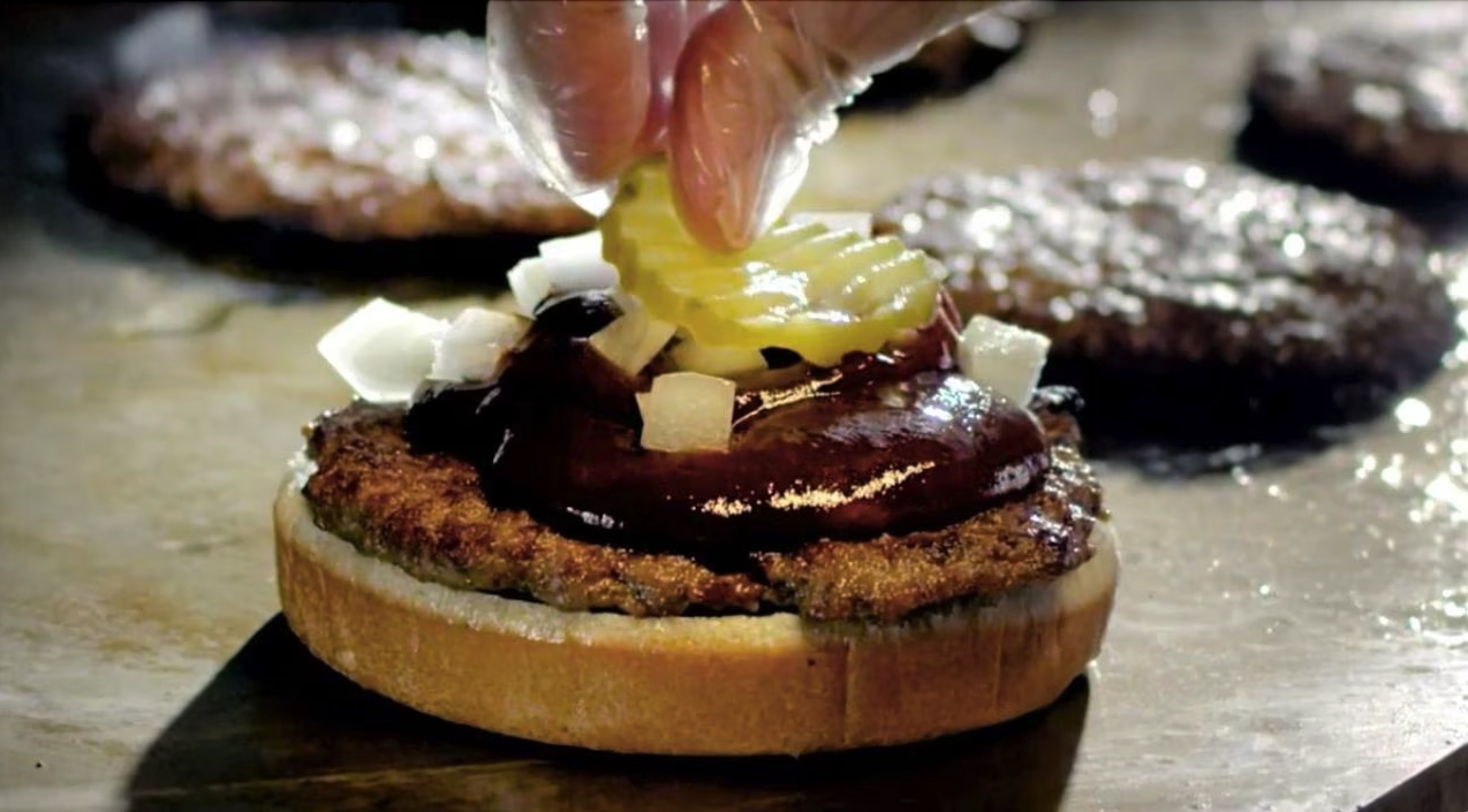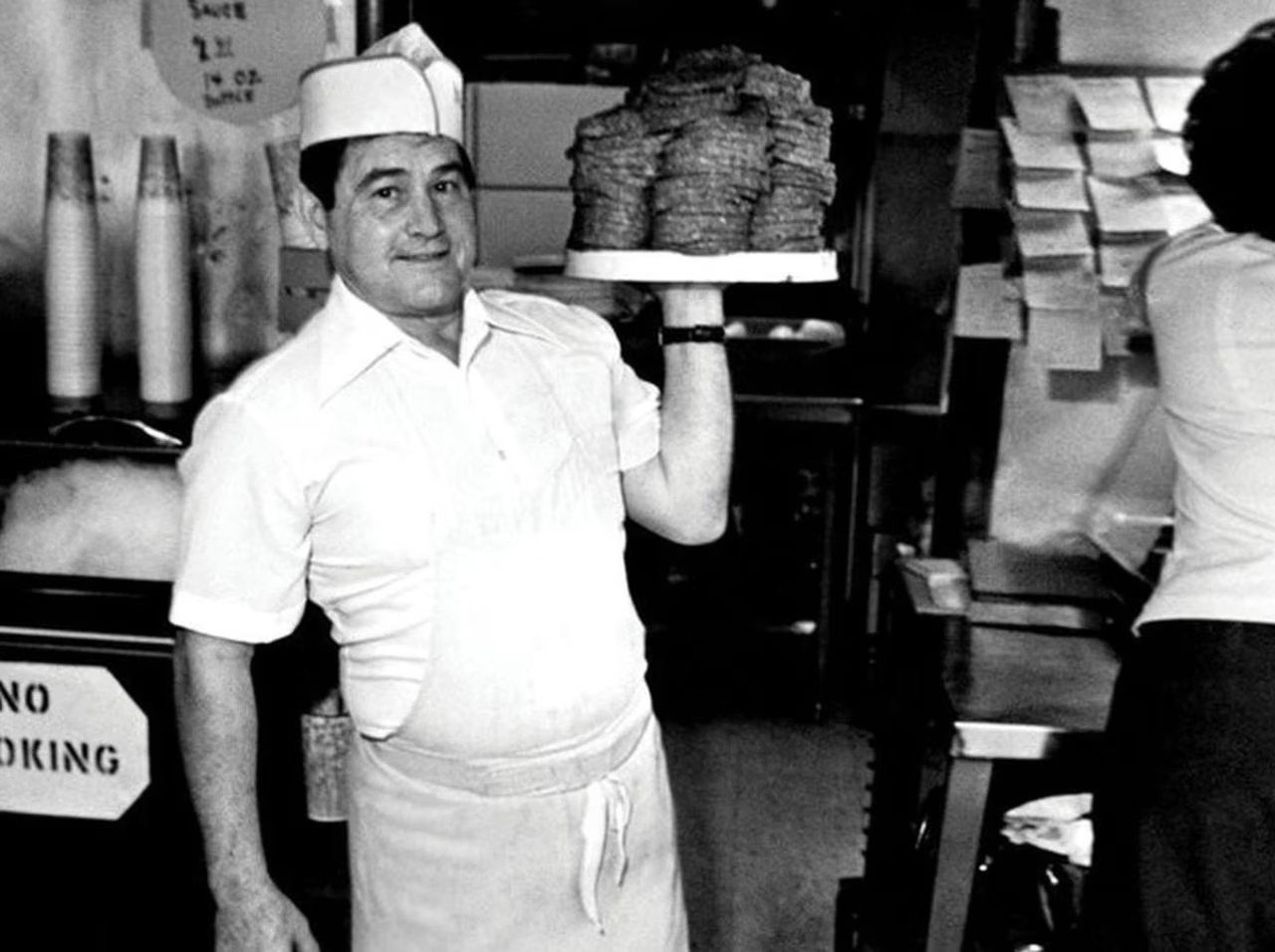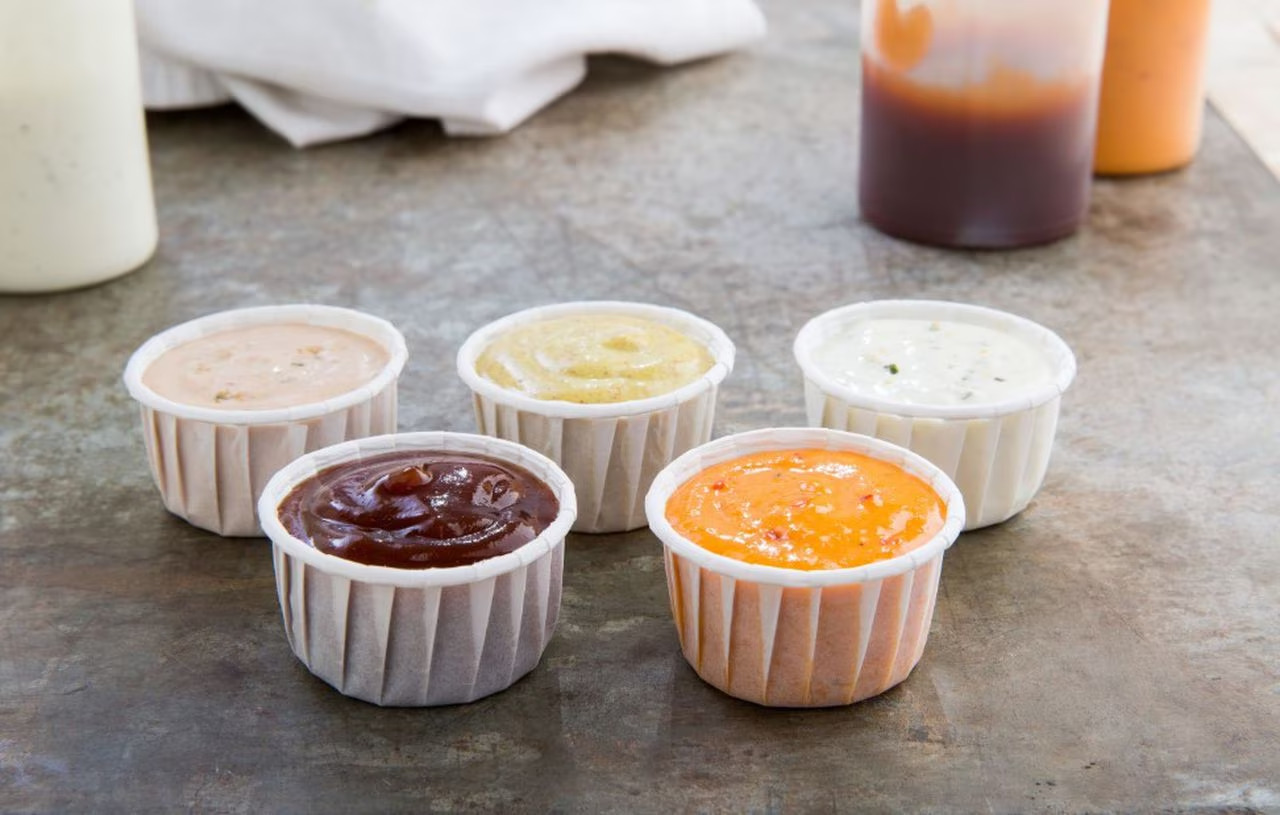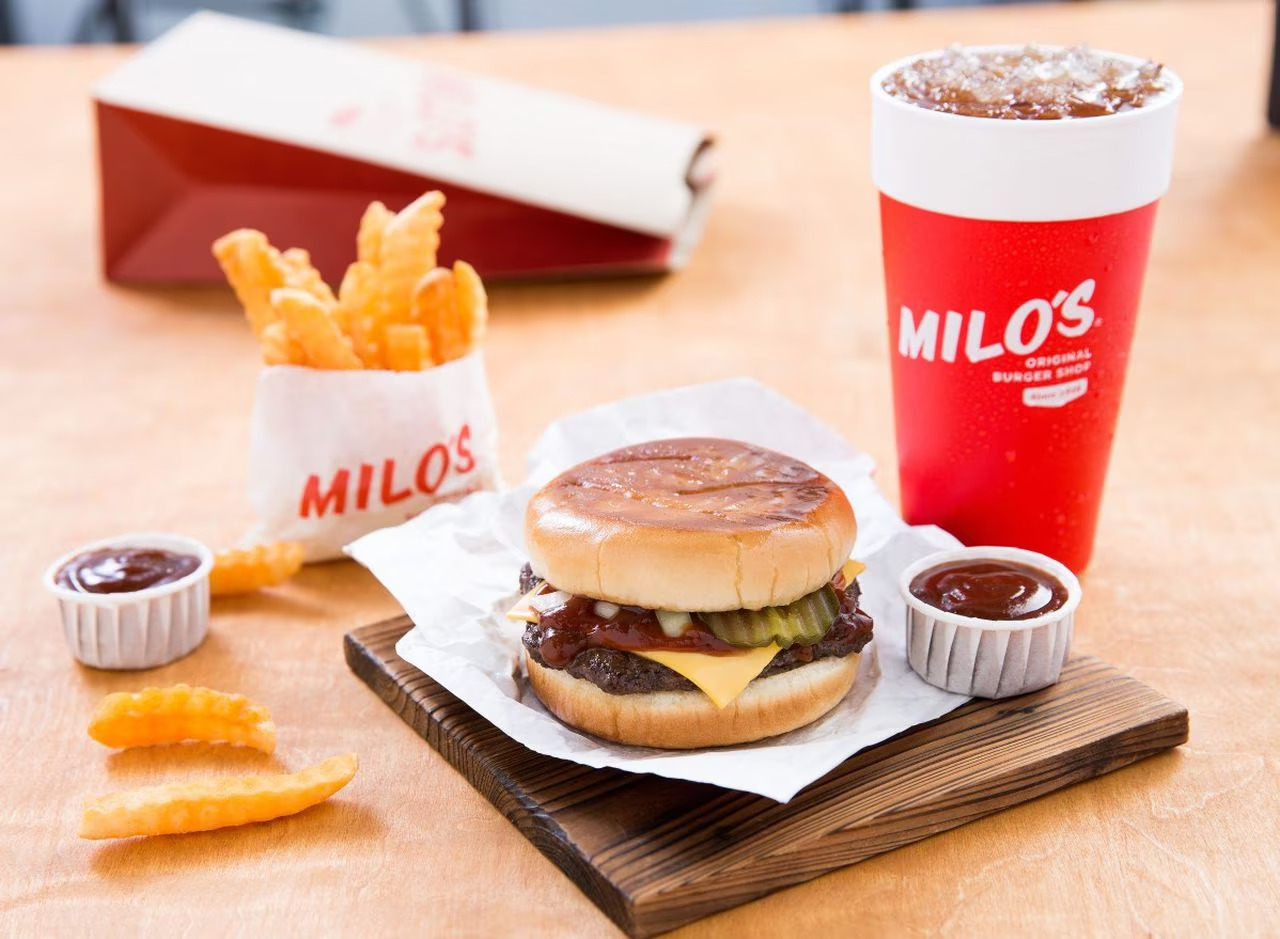
Tom Dekle’s memory drifts back to the early 1970s, when he was a teenager and his father would drop him and his younger brother off at the old Milo’s Hamburgers stand in north Birmingham.
Milo Carlton, who started his burger shop after serving as a mess cook during World War II, manned the grill. His wife, Beatrice – or “Mama Bea” to those who knew her best – worked the front window.
Dekle and his younger brother, Scott, would pick up a cardboard box filled with enough Milo’s burgers to feed them and all the guys at his father’s Ensley food warehouse.
Those burgers – served with chopped onions, a couple of pickle slices and a liberal dousing of Milo Carlton’s special sauce – left a lasting impression on the teenage Dekle.
“Man, it was awesome,” he recalls. “It was like it is today. It was different. It was messy. I don’t know that you could use fancy terms like a delicacy or anything like that. It was just good.”
Nearly a half-century later, as the CEO of the Birmingham-based Milo’s Hamburgers chain, the 63-year-old Dekle is one of a select few entrusted with the recipe to Milo’s secret sauce, which is safely stored and password-protected in “a digital Fort Knox,” he says.
“The sauce is obviously proprietary, and only a handful of people know the formula,” Dekle says. “The Carltons, obviously, know what it’s about. But even today, there are only two or three of us that know what the formula is.”
Figuring out all the secret ingredients would only unlock part of the mystery of Milo’s magical sauce, though.
“It’s not only the ingredients,” Dekle says. “It’s the sequence in which the ingredients are put together. It has to have precise temperatures, and because it’s a cooked sauce, there is a cooking time at the various stages.
“To be so simple and so good, it’s complicated, and that’s probably the reason why nobody’s ever knocked it off,” he adds.
“For us, it’s this very unique, savory sauce that just enhances the whole experience of eating a burger.”
These days, Milo’s makes its sauce in batches of 250 gallons at a time, and it takes about six hours to prepare each batch, Dekle says.
“We go through over 3,000 gallons a month, or about 40,000 gallons a year,’’ he says. “It’s a lot.”

A trial-and-error experiment
After he returned home from the war, Milo Carlton and his bride, Bea, opened the original Milo’s Hamburgers shop on Aug. 19, 1946, on 12th Avenue North near Carraway Hospital in Birmingham’s Norwood neighborhood.
He wanted to make his burgers unique, so he came up with his signature sauce by trial and error, testing it out on his customers until he got it just the way he – and they – liked it.
“The customers would tell me it was too hot or too sweet, and the next time I made it, I would change it by what they had been telling me,” Carlton once said. “When they started telling me to put a lot of that sauce on their burgers, I knew I had it just right.”
In 1963, Milo and Bea moved their burger shop to 2820 10th Ave. North, where it remained until it closed in 1986. That old building — where Tom Dekle was first introduced to Milo’s — is now home to The Pit BBQ.
After Ronnie Carlton, Milo and Bea’s son, took over as president of Milo’s in 1980, he came up with the idea of franchising the family business. Soon after, in 1983, Dean Chitwood opened the first Milo’s franchise near UAB on Birmingham’s Southside. Other locations followed in Roebuck, Vestavia Hills and at Eastwood Mall.
In 2002, the Carlton family sold the restaurant part of their business to the Chitwood family and focused on expanding their rapidly growing Milo’s Tea brand, another Milo’s favorite that goes back to the early days of Milo and Bea Carlton’s burger shop. That business is now headed by their granddaughter Tricia Wallwork.
Then, in 2011, Dekle and a group of local investors bought Milo’s Hamburgers from the Chitwoods and have since grown Milo’s to include 20 locations around Alabama – primarily in Birmingham but also in Cullman, Decatur, Jasper, Montgomery, Prattville and Tuscaloosa. Two new locations – one in Pell City and another in Cahaba Heights – are scheduled to open later this year.
“When we bought the business in 2011, we knew it was a wonderful business,” Dekle says. “Our whole approach was to not change it, to not mess with what really worked.
“We may have added an item or two and added breakfast, but the foundation is still the same — the same, great, original burger with that little piece of meat on there.”
That “little something extra,” as Dekle calls it, is another Milo’s signature that Milo Carlton originated back in the day. When his hamburger patties would sometimes fall apart on the grill, he would put those broken pieces on top of his burgers as a little bonus to his customers, and thus began another Milo’s tradition.
“And to this day, that’s the way we do it,” Dekle says. “We take the spatula and we just break off about a fifth of a piece of a patty and put it on top.
“If we forget sometimes and don’t put it on there, customers bring it back and say, ‘I don’t know whose burger this is, but it’s not mine.’”

Still an overwhelming fan favorite
Over the years, Milo’s has also introduced several new sauces – including ranch, honey-mustard, a spicy Boom Boom sauce and a Double-O sauce that combines the ranch and original Milo’s sauces – that are served as dipping sauces for its hand-breaded chicken tenders.
Despite the new competition, though, the original Milo’s sauce remains an overwhelming fan favorite.
“Oh, yes, absolutely,” Dekle says. “I haven’t stopped and looked at it, but based on just what we buy, it’s probably 10-1, probably more than that.”
Not everybody is sold on Milo’s legendary sauce, though, Dekle acknowledges.
That’s why Milo’s offers customers the option of ordering a sauce-free burger they call “The Other Way.”
“I loved the sauce from the beginning,” Dekle says. “But even today, there are two categories of Milo’s sauce customers. Either you just love it and there is just absolutely nothing like it, or you kind of scratch your head and say, ‘I don’t know if I get that sauce thing.’”
Even Dekle’s future son-in-law, Jacob Lee, had to be persuaded when he first met the family.
“It was kind of like, ‘If you are going to be part of the family, you’re going to have to eat Milo’s,” Dekle says. “So, he tried it and was like, ‘Um, I don’t know about that sauce thing.’ But now, he’s full-blown hooked.”
6,500 bottles of sauce, gone in a week
This spring, after the coronavirus pandemic started to spread into Alabama, Milo’s Hamburgers sprang into action and launched its Alabama Strong initiative, donating about 4,000 meals to children who were missing their school lunches due to the outbreak and another 6,000 meals to the hospital workers on the front lines of the pandemic.
That’s also when the Milo’s marketing team hit on the idea of bottling its famous sauce for a limited-time-only fundraising campaign.
“We have talked about selling the sauce in bottles off and on for years, and it just never really made good sense,” Dekle says. “It’s a refrigerated product. It has a limited shelf life. That was always our concern.
“But we are in times we’ve never been, in places we’ve never been,” he adds. “And there are people with needs like there have never been. So, we said, ‘Look, let’s do something that we’ve never done.’”
Each Milo’s location went into full assembly-line mode, using the hand-pumps at the customer condiment stations to fill 16-ounce plastic bottles with Milo’s sauce — a laborious process that took roughly 50 seconds to fill each bottle.
“We were literally pumping 16 ounces’ worth of sauce about a half-ounce at a time,” Dekle says.
They filled between 50 and 100 bottles at each location every day and sold them for $5 a bottle, with $2 of that going to feed hungry children as part of the Alabama Strong campaign.
“Our wonderful customer base really latched onto it,” Dekle says. “Within a week, we sold all 6,500 bottles. So, we now have $13,000 we are going to give to charity. We are trying to figure out who those organizations are that fit the best, but it was a very successful program.
“It was really fun to watch,” he adds. “Again, 6,500 bottles in a week — filled and gone. And we’re still getting requests: ‘Hey, when are you going to be back in stock?’ We don’t have a hard answer for that yet.”
Now, though, it’s possible that Milo’s will bottle and sell its sauce for a charity promotion each year, Dekle adds.
“We went into this with the idea it was probably going to be a one-time thing,” he says. “But it was so popular, and it has such a good-cause element to it (that) we may make it an annual thing.”

First encounters, lasting memories
Just about every time he walks into one of his restaurants, Tom Dekle is reminded of those days when his father used to drop him off at the old Milo’s Hamburgers in north Birmingham to pick up a box full of burgers.
“Very few times I’m in a store where somebody doesn’t say, ‘I used to go to the original one,’” he says. “And I will ask them, ‘When did you first start?’
“And they always know,” he adds. “They always know when they first encountered Milo’s.”



 Previous
Previous